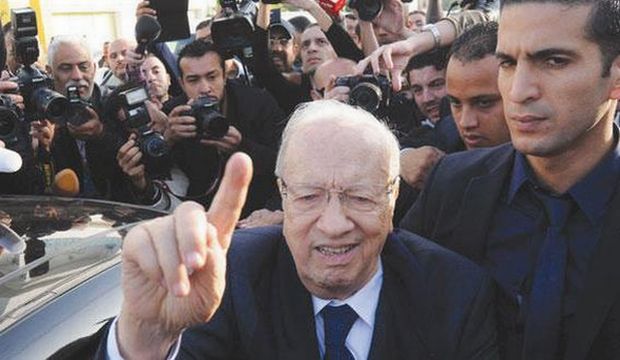
Presidential candidate and Nidaa Tounes party leader Beji Caid El-Sebsi leaves a polling station after casting his vote, during the first round of the Tunisian presidential election, in Soukra, outside the capital Tunis, on Sunday, November 23, 2014. (AP Photo/Mohamed Werteni)
Tunis, Asharq Al-Awsat—Veteran Tunisian politician Beji Caid El-Sebsi leads the race to become Tunisia’s first directly elected president since the ouster of Zine El-Abidine Ben Ali in 2011, according to initial exit polls.
Sebsi’s campaign manager claimed he was ahead of his nearest rival, incumbent Moncef Marzouki, by at least 10 points, though he added there was a “strong possibility” the vote could go to a second round, according to the Associated Press.
Another vote will be held on December 31 between the top two candidates in the race if no candidate is able to gain at least 50 percent of the vote.
Figures from one polling company indicated Sebsi currently had 47 percent of the vote, with Marzouki on 27 percent. Other polling companies gave similar initial results, according to the Associated Press.
Meanwhile, Marzouki’s campaign manager, Adnan Munsir, told reporters on Sunday that the “worst case scenario” for Marzouki would be a second-round runoff with Sebsi, with a possibility still remaining for his candidate to jump ahead of Sebsi “by two to four percentage points.”
Initial figures from the country’s independent elections commission indicated turnout had reached around 54 percent of a total electorate of 5.3 million Tunisians, after figures from earlier in the day had pointed to a much lower 20 percent.
Sebsi, whose Nidaa Tounes party won a plurality in parliamentary elections on October 26, has run on a platform of returning stability to the country, which has seen a number of security problems and plummeting economic fortunes since kick-starting the Arab Spring in January 2011.
Some voters have been wary, however, of Sebsi’s past, with the 87-year-old having served as head of parliament during the Ben Ali era.
Marzouki, meanwhile, faces similar suspicions from voters, due to his links with the then-ruling Ennahda Movement, which helped bring him to power in 2011, and which many Tunisians are now wary of due to the turbulent period during which they were in power in parliament.
Speaking to a number of voters outside polling stations on Sunday, Asharq Al-Awsat found that many were still undecided on who to vote for up until the last minute.
Forty-year-old Rawda said she still hadn’t decided who to vote for, “but what I’m sure of is that I cannot vote for Sebsi. He will return to us Ben Ali’s men.”
Speaking of Marzouki, she said: “He is in cahoots with Ennahda. And he didn’t do anything for Tunisia [during his presidency]. He had his chance and he wasted it.”
Businessman Abdelghani Khedeira, who went to the polls in the morning, said he was voting for Sebsi, whom he hoped would win from the first round, and said he had gone to the polls as he wanted to do his “historic duty” for his country.
He added, explaining his vote for the octogenarian veteran: “Sebsi is an accomplished statesman who possesses experience and merit. He will return Tunisia’s prestige, and will put an end to the lack of security and chaos that the country is living through.”
Also speaking to Asharq Al-Awsat, Nawal Saleh, who came to vote with her husband and children, declined to reveal who she was voting for, but lamented what she saw as a low election turnout.
“I feel really bad because Tunisians have failed to realize the importance of their votes. I remember well the 2011 [parliamentary] elections; it was like a day of celebration, everyone was happy, and all the polling stations were crowded. Back then, we even heard [women] ululating. I don’t know why everyone is scared now . . . I think the security presence is worrying people, and that is why people are afraid of what will happen [if they come to vote].”
More than 50,000 security forces were sent to secure polling stations and public spaces across the country on Sunday, along with 30,000 members of the armed forces across polling stations.
Despite the day running generally smoothly, there were some violent instances. Amina El-Qalal, from NGO Human Rights Watch’s Tunisia office, told Asharq Al-Awsat some violent incidents had occurred on the day in the Western El-Karam region, some 37 miles (60 kilometers) northwest of the capital Tunis.
She added, however, that the incidents were “limited and won’t have an effect on the final results of the poll.”
Despite security troubles, political instability and a struggling economy, Tunisia is generally regarded to have fared better than fellow Arab Spring countries Libya and Egypt. The election of the new president is seen as the final step in the country’s transition to a fully fledged democratic system.
Monji Saidani contributed additional reporting.
